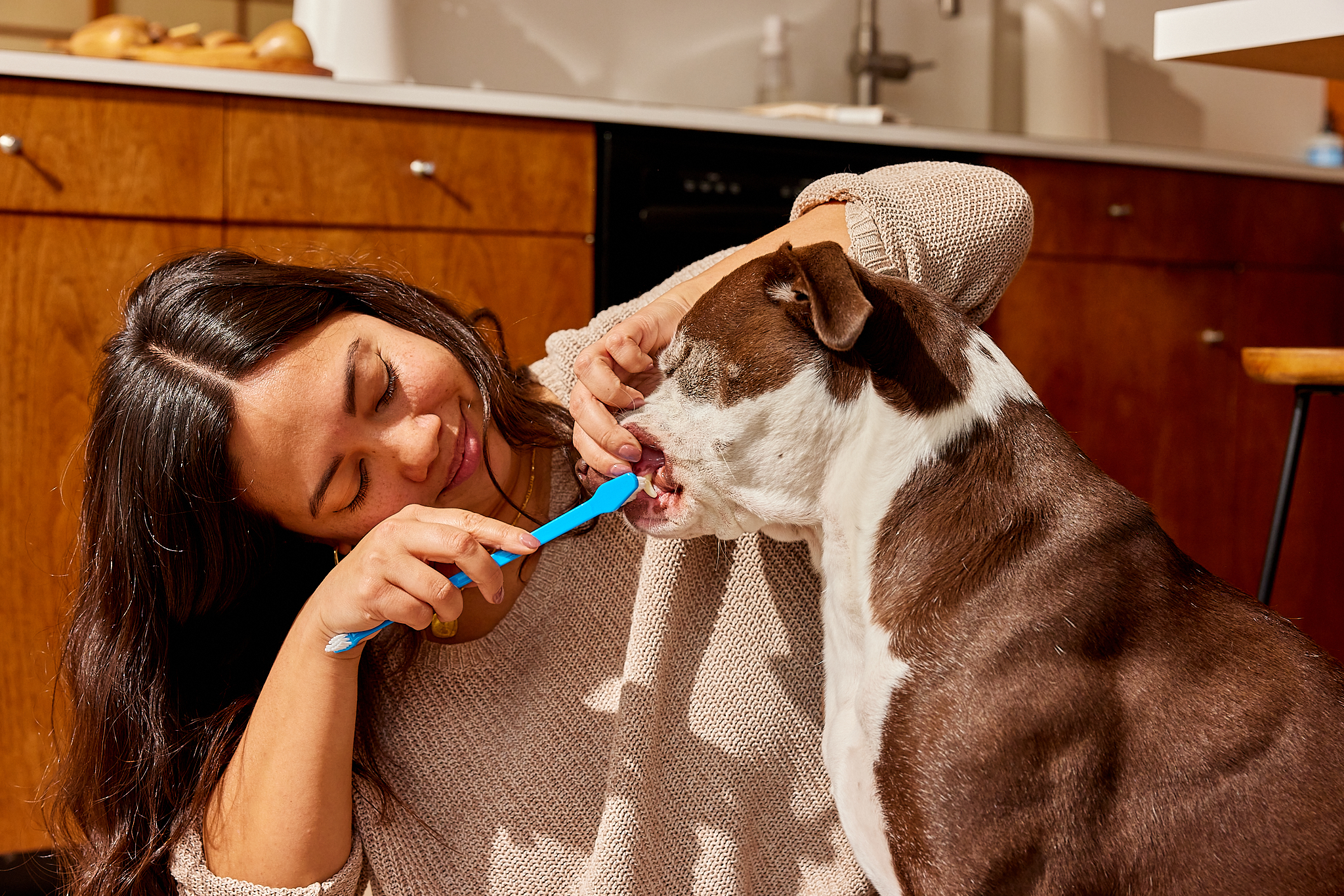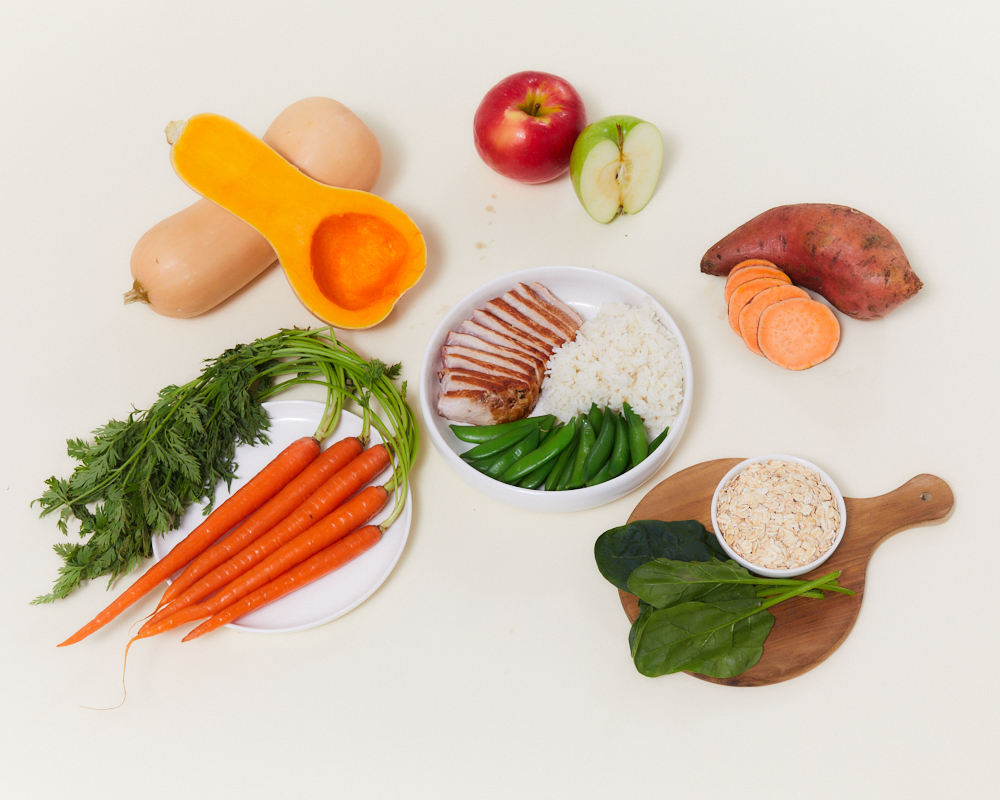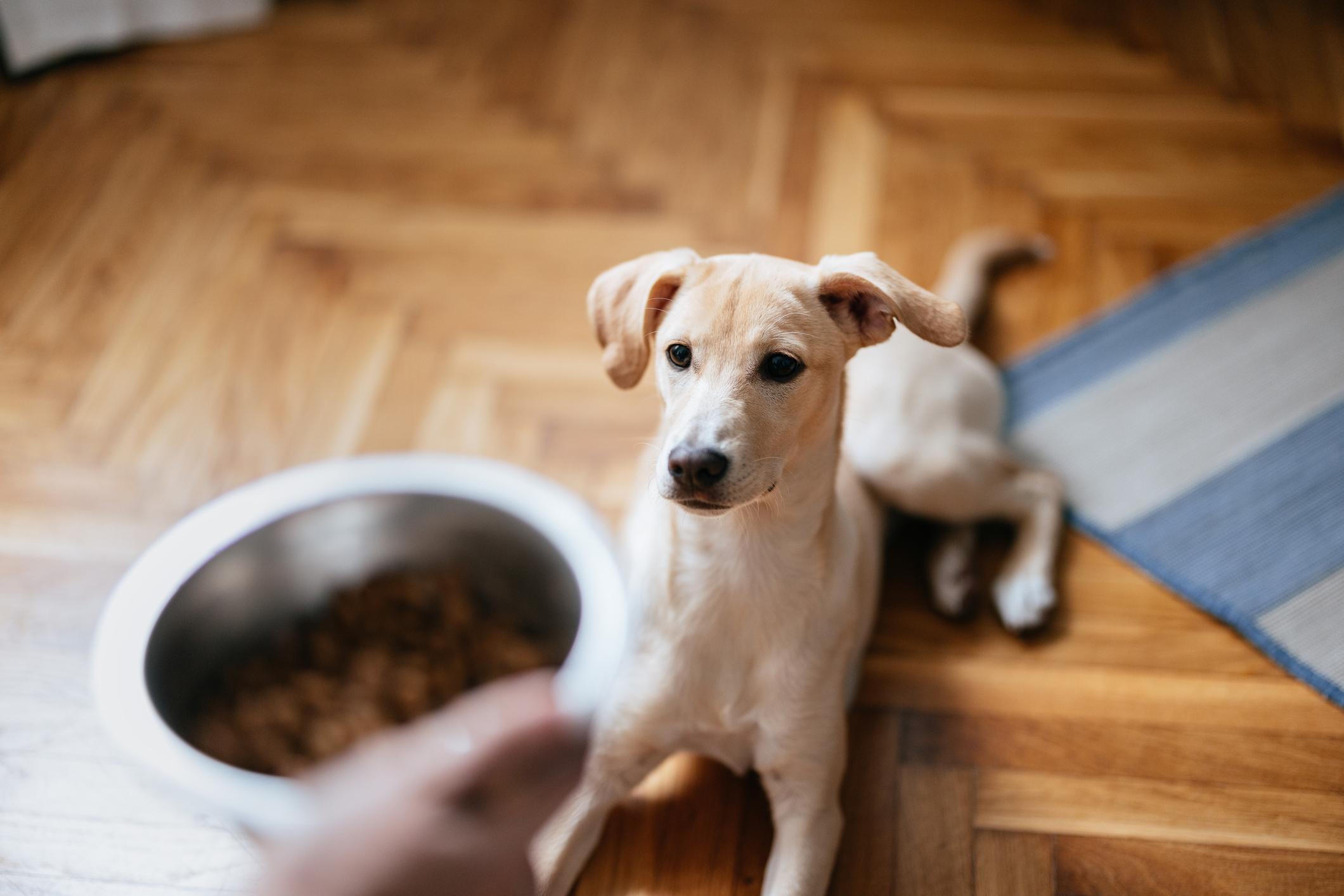Hey Ollie blog readers! We’re offering you an exclusive 60% OFF your starter box! Try now!
February is National Pet Dental Health Month and as good of a time as any to give some extra time and attention to your pup’s oral care. We sat down with Dr. Lindsay Cassibry, veterinarian and head of the Ollie Health team, to brush up on our dog dental health knowledge and learn how we can better care for our canines’ canines.
Why is your dog’s dental health so important?
Dental health goes beyond your dog’s teeth. Dental disease can lead to serious health issues as the bacteria can enter the bloodstream and spread to vital organs like the heart, kidneys, and liver, potentially causing severe infections or other health problems.
“Dental disease is one of the most common medical conditions veterinarians see in dogs.” Dr. Lindsay says, Over 80% of dogs over the age of 3 years old have active dental disease*.”
Many compounding issues are linked to dental disease besides the common bad breath, tooth loss, and pain and discomfort. The pain and discomfort these dogs experience can make it difficult to eat, drink, or even play, ultimately affecting their quality of life. Keeping a dog’s teeth healthy can help them live longer, reducing the risk of developing other systemic diseases that can arise from untreated oral infections.
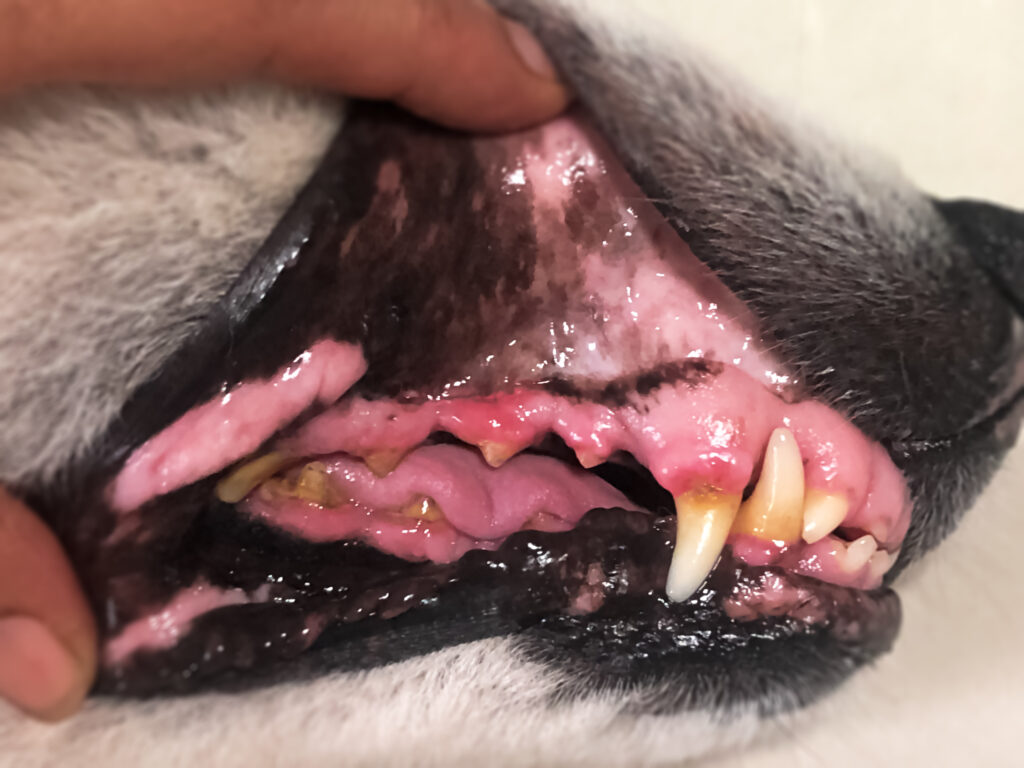
Identifying the signs of dental and oral health issues
Regularly checking your dog’s mouth (gently lifting the lips) and brushing their teeth can help you spot early signs of dental problems. If you notice any of the below symptoms, it’s a good idea to schedule a visit to the vet. They can perform a thorough oral exam and, if necessary, recommend a professional cleaning or further treatment.
Early signs of dental problems:
- Bad breath
- Discolored teeth or plaque buildup on the teeth
- Red or bleeding gums
More severe symptoms to look out for would include:
- Difficulty eating
- Excessive drooling
- Loose or missing teeth
- Changes in behavior
- Pawing at the mouth
- Visible infection where pus is coming from the mouth
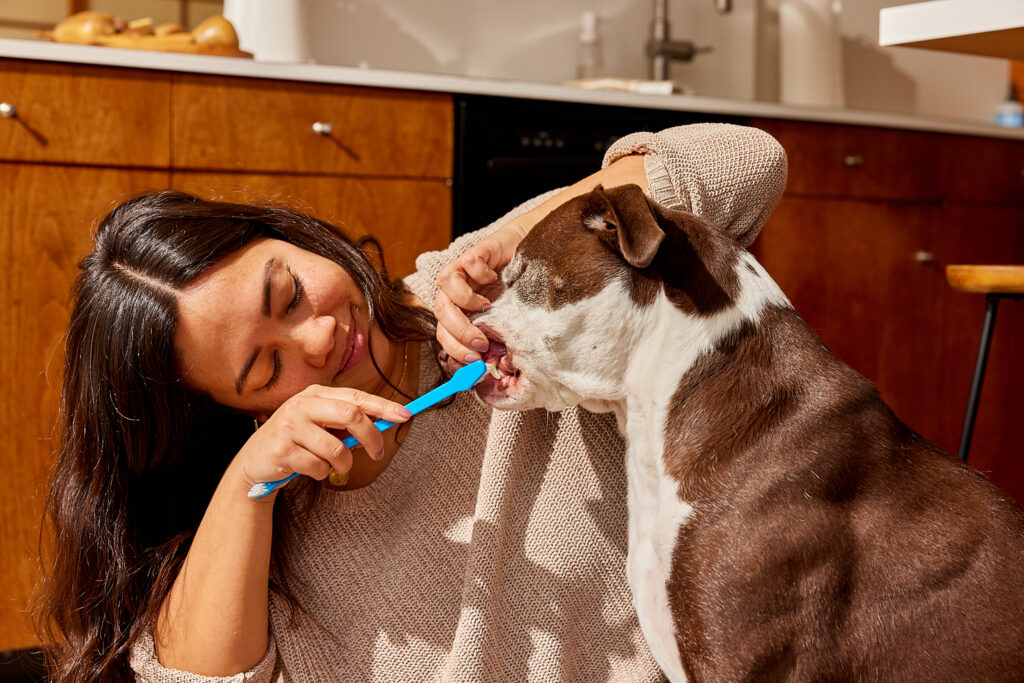
How to safely and effectively brush your dog’s teeth
Brushing your dog’s teeth is one of the best ways to maintain your pup’s dental health. Brushing their teeth will help prevent plaque and tartar buildup, reduce bad breath, prevent gum disease, and help prevent bacteria from traveling to other organs that will affect your dog’s overall health.
“Brushing your dog’s teeth does require some patience,” says Dr. Lindsay, “If you can start them out when they are a puppy, it will help to get them used to the process so you can continue it throughout their life.”
Here are some tips for safely caring for your dog’s teeth:
- Use dog-specific toothpaste. Human toothpastes can contain ingredients like xylitol that are toxic to dogs.
- Take things slow at first. Let your dog smell and lick the toothbrush and toothpaste. Gradually work up to using the toothbrush and keep a calm and positive demeanor using praise and treats.
- Start with short sessions. Focus on the outer surface of the teeth where the plaque and tartar tend to build up the most. Try to reach the back teeth, but be gentle while doing so.
- Increase over time. Keep your sessions consistent and gradually increase to 1-2 minutes, focusing on the entire mouth. The back molars tend to build up tartar and plaque as they are the hardest to reach, so don’t forget to brush in the back!
- Brush frequently and consistently. Just as we brush our teeth daily, it would be ideal for their teeth to be brushed daily as well. However, brushing 2-3 times a week is a great start to prevent dental disease in your pup!
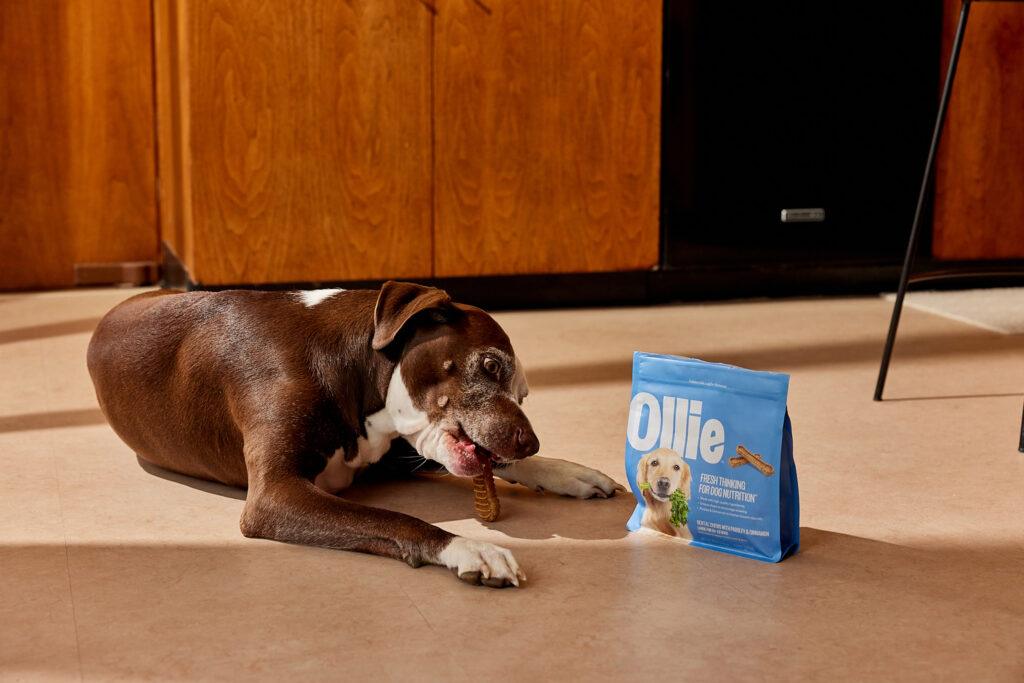
Other ways to care for your dog’s dental health
While brushing your dog’s teeth is the most effective way to prevent dental disease, there are other methods you can use in addition to brushing that will help maintain their oral health! Dental treats, such as Ollie’s Dental Chews, are designed to help scrape the dog’s teeth as they chew, mechanically removing plaque and freshening the breath. Dental wipes are a good option in between brushing sessions for dogs that make it difficult to brush their teeth. Water additives can also help freshen breath and reduce bacteria in the mouth.
Annual check-ups with your veterinarian help to ensure early signs of dental disease are addressed before they become a more serious health issue. Professional cleanings will be recommended as necessary.
Which breeds are more prone to dental problems?
While all dogs are at risk of experiencing dental issues if their teeth are not consistently cared for, some breeds are more susceptible than others due to their genetics, size, and structure of their teeth and jaws.
Understanding breed-specific tendencies can help you proactively manage your dog’s dental health and prevent serious problems down the road. Small breeds like chihuahuas, dachshunds, yorkies, and shih tzus tend to have crowded teeth, gum disease, tooth loss, and retained baby teeth. Small dogs benefit significantly from regular brushings and annual dental exams to catch early signs of gum disease and tartar buildup. Brachycephalic breeds, such as bulldogs, pugs, and boxers, have mouth structure issues since they have short, flat faces. They will also have an improper bite alignment because of their facial structure.
Regardless of the breed, oral health is essential in all dogs! Early intervention is key. Start brushing their teeth as a puppy daily and listen to your veterinarian’s advice on when professional cleaning is needed. Some breeds will need professional cleanings more frequently.

Getting a Dental Screening with Ollie
In addition to delicious, nutritious food, Ollie offers different Health Screenings to give members insights into key aspects of their dogs’ health. Our Dental Screening allows Dr. Lindsay and the Ollie Health team to check your dog’s teeth for plaque and tartar buildup, as well as signs of gingivitis, fractures, and retained baby teeth through a single photo. Based on this photo, our expert team will recommend either continuing with your current oral health routine, adding in more frequent brushing and/or other ways to reduce plaque and tartar buildup, or let you know that it is time to seek veterinary care.
Dental Screenings can be submitted as regularly as you like; however, we recommend at least every six months for the best results.
Want a quick and easy check that your dog’s oral health is where it should be? Ollie’s Dental Screening can help detect early signs of dental issues and put you on the right track. Our Health Screenings are available for free with your Ollie membership, exclusively in the Ollie app.
Tagged As:

The nutrition your dog needs,
the food they want.

Enjoying our articles? Subscribe our Newsletters and get new articles directly to your inbox
You might also like
25 August 2025
6 MINS READ
Human-Grade Ingredients That Soothe Dog Allergies Fast
If your dog suffers from persistent itching, digestive upset, or recurring ear infections, you’re not alone. Only 0.2% of dogs are actually affected by food allergies [1], yet food allergy is diag…
by Ollie Pets
18 August 2025
9 MINS READ
Nourish Skin from Within: Fresh Dog Diet Benefits
If your dog is constantly scratching, licking their paws, or has a dull, flaky coat, it’s not just frustrating—it could be a sign that something’s off in their diet. Skin and coat issues are som…
by Ollie Pets
12 August 2025
5 MINS READ
Top 8 Allergens Hiding in Your Dog’s Bowl
As pup parents, we never want to see our dogs uncomfortable. When it comes to itching, swelling, and upset stomachs, the culprit may be in their bowl. Understanding the most common allergens and t…
by Ollie Pets
